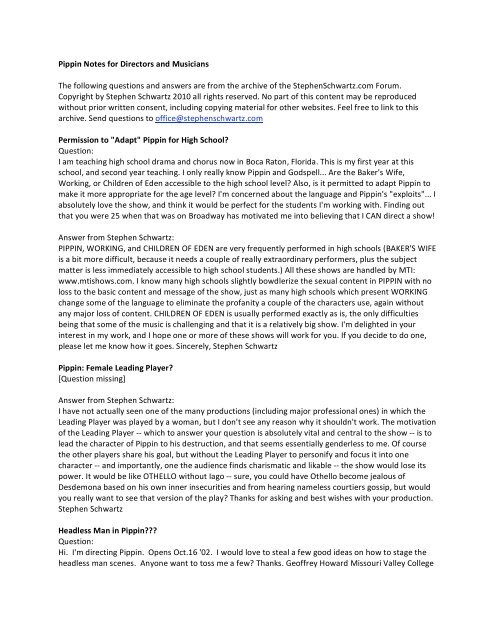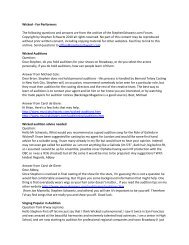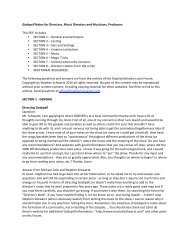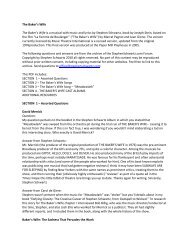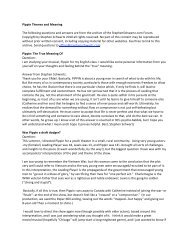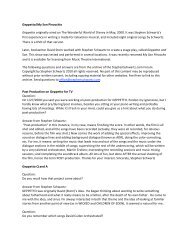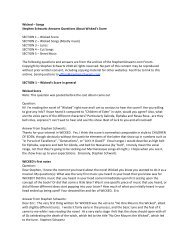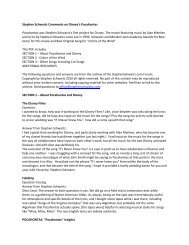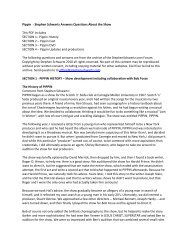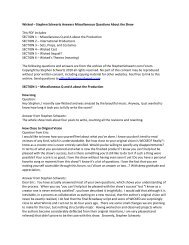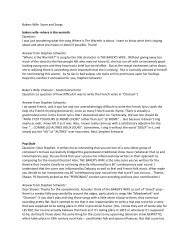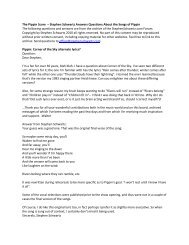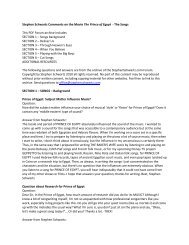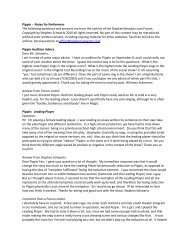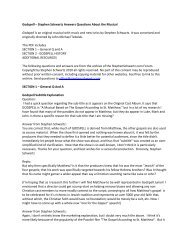Pippin Notes for Directors - Stephen Schwartz
Pippin Notes for Directors - Stephen Schwartz
Pippin Notes for Directors - Stephen Schwartz
You also want an ePaper? Increase the reach of your titles
YUMPU automatically turns print PDFs into web optimized ePapers that Google loves.
<strong>Pippin</strong> <strong>Notes</strong> <strong>for</strong> <strong>Directors</strong> and Musicians <br />
<br />
The following questions and answers are from the archive of the <strong>Stephen</strong><strong>Schwartz</strong>.com Forum. <br />
Copyright by <strong>Stephen</strong> <strong>Schwartz</strong> 2010 all rights reserved. No part of this content may be reproduced <br />
without prior written consent, including copying material <strong>for</strong> other websites. Feel free to link to this <br />
archive. Send questions to office@stephenschwartz.com <br />
<br />
Permission to "Adapt" <strong>Pippin</strong> <strong>for</strong> High School? <br />
Question: <br />
I am teaching high school drama and chorus now in Boca Raton, Florida. This is my first year at this <br />
school, and second year teaching. I only really know <strong>Pippin</strong> and Godspell... Are the Baker's Wife, <br />
Working, or Children of Eden accessible to the high school level? Also, is it permitted to adapt <strong>Pippin</strong> to <br />
make it more appropriate <strong>for</strong> the age level? I'm concerned about the language and <strong>Pippin</strong>'s "exploits"... I <br />
absolutely love the show, and think it would be perfect <strong>for</strong> the students I'm working with. Finding out <br />
that you were 25 when that was on Broadway has motivated me into believing that I CAN direct a show! <br />
<br />
Answer from <strong>Stephen</strong> <strong>Schwartz</strong>: <br />
PIPPIN, WORKING, and CHILDREN OF EDEN are very frequently per<strong>for</strong>med in high schools (BAKER'S WIFE <br />
is a bit more difficult, because it needs a couple of really extraordinary per<strong>for</strong>mers, plus the subject <br />
matter is less immediately accessible to high school students.) All these shows are handled by MTI: <br />
www.mtishows.com. I know many high schools slightly bowdlerize the sexual content in PIPPIN with no <br />
loss to the basic content and message of the show, just as many high schools which present WORKING <br />
change some of the language to eliminate the profanity a couple of the characters use, again without <br />
any major loss of content. CHILDREN OF EDEN is usually per<strong>for</strong>med exactly as is, the only difficulties <br />
being that some of the music is challenging and that it is a relatively big show. I'm delighted in your <br />
interest in my work, and I hope one or more of these shows will work <strong>for</strong> you. If you decide to do one, <br />
please let me know how it goes. Sincerely, <strong>Stephen</strong> <strong>Schwartz</strong> <br />
<br />
<strong>Pippin</strong>: Female Leading Player? <br />
[Question missing] <br />
<br />
Answer from <strong>Stephen</strong> <strong>Schwartz</strong>: <br />
I have not actually seen one of the many productions (including major professional ones) in which the <br />
Leading Player was played by a woman, but I don't see any reason why it shouldn't work. The motivation <br />
of the Leading Player ‐‐ which to answer your question is absolutely vital and central to the show ‐‐ is to <br />
lead the character of <strong>Pippin</strong> to his destruction, and that seems essentially genderless to me. Of course <br />
the other players share his goal, but without the Leading Player to personify and focus it into one <br />
character ‐‐ and importantly, one the audience finds charismatic and likable ‐‐ the show would lose its <br />
power. It would be like OTHELLO without Iago ‐‐ sure, you could have Othello become jealous of <br />
Desdemona based on his own inner insecurities and from hearing nameless courtiers gossip, but would <br />
you really want to see that version of the play? Thanks <strong>for</strong> asking and best wishes with your production. <br />
<strong>Stephen</strong> <strong>Schwartz</strong> <br />
<br />
Headless Man in <strong>Pippin</strong>??? <br />
Question: <br />
Hi. I'm directing <strong>Pippin</strong>. Opens Oct.16 '02. I would love to steal a few good ideas on how to stage the <br />
headless man scenes. Anyone want to toss me a few? Thanks. Geoffrey Howard Missouri Valley College <br />
Answer from a director: <br />
The last time I directed it, I had someone throw out a special head we made up in the scene where the <br />
body parts are tossed on stage. When the cleanup crew came out, they placed the head on a spike we <br />
had on top of a short castle tower that was part of the set. An actor in the tower then put his hand in <br />
the head and manipulated it like a puppet to speak to <strong>Pippin</strong>. The audience liked it." <br />
<br />
Answer from another director about their “low tech” headless man: <br />
For the first headless man scene, we had an actor crouching inside a box with just his head sticking out <br />
and an orange‐y red material draped around (sort of looked like blood). Then, out of the side of the box, <br />
we had another actor lie down so that his head was not visible and so that he looked like he had been <br />
decapitated. <br />
<br />
For the second scene, we rigged up a "headless man" costume involving a very large trench coat (our <br />
actor was fairly short), with fake "shoulders" attached above the actor's actual head underneath the <br />
coat. The coat was buttoned and the arms and hands were stufffed to look like they were holding the <br />
head, which stuck out of what looked like the "belly" of the costume. We stuck the same red material in <br />
the neck of the coat. The actor then walked onstage to say his lines and walked off...like I said, VERY <br />
low‐tech, but it got a chuckle and served it's purpose. <br />
<br />
...For the finale fire, we rigged up a fan, red strobe light, and flame‐shaped piece of orange gossamer <br />
which looked AWESOME (when it worked). <br />
<br />
PIPPIN: I Guess I'll Miss the Man <br />
[Question/comment about the cutting of “I Guess I’ll Miss the Man.” <br />
<br />
Answer from <strong>Stephen</strong> <strong>Schwartz</strong>: <br />
I'm happy to say I personally have never seen a production where the song "I Guess I'll Miss the Man" is <br />
cut. What a bad idea. Any director who cuts the song does not understand the show. However, I suspect <br />
the reason they do it is because in the MTI script, the lines in which the Leading Player tells Catherine: <br />
"You don't have a song here ... you better stop singing now" (as she continues to sing) are cut. I think <br />
those lines should be restored. Sincerely, <strong>Stephen</strong> <strong>Schwartz</strong> <br />
<br />
PIPPIN: "With You" ‐ Terminology Question <br />
Question: <br />
I wanted to know what the tempo marking 'Melted Butter' means in the song 'With You' from <strong>Pippin</strong>. Is <br />
there a roundabout metronome marking <strong>for</strong> that section? I've tried searching the entire site and didn't <br />
come up with anything. I figure it is a description of a kind of feel, but I didn't want to just assume that. <br />
<br />
Answer from <strong>Stephen</strong> <strong>Schwartz</strong>: <br />
I have no idea what version(s) of "With You" have the tempo marking "Melted Butter", and it's certainly <br />
not a description that I suggested. I checked my copies of the music and they all simply say "Gently" ‐‐ <br />
whoever came up with "Melted Butter" was certainly creative, though. Anyway, my suggestion would be <br />
approximately quarter note = 68. Hope that helps and thanks <strong>for</strong> your interest, <strong>Stephen</strong> <strong>Schwartz</strong> <br />
<br />
Copyright <br />
Question from “Manfred” <br />
Hi <strong>Stephen</strong>. I see that a lot of people write to you to ask your opinion about making changes to your <br />
shows. In MTI librettos it says "You are not permitted to make any changes to the music, lyrics or
dialogue of the Play, including the interpolation of new material and/or the exclusion of existing <br />
material." <br />
<br />
I am very concerned about this, and also very surprised that so many people seem to be publicizing the <br />
fact that they have apparently broken their licensing agreement. I would value your opinion on the <br />
matter, because the libretto clearly says the copyright belongs to the authors and that "Any changes <br />
shall constitute a wilful infringement of said copyright"...I interpret this to mean that if you don't mind, <br />
nobody minds. <br />
<br />
Here are the changes I'm thinking about <strong>for</strong> <strong>Pippin</strong>: <br />
1) The libretto and score disagree in several places, so you choose which to keep. <br />
2) A full band isn't available, so you make a compromise on who plays what. <br />
3) Some of the incidental music gets cut, because we can't do it justice. <br />
4) I'd love to extend a short song by inserting a verse from the original printed vocal selection (later <br />
dropped). I'm thinking here of "I Guess I'll Miss The Man". <br />
5) We'd like to keep the original ending, but hear the Leading Player sing "Join us" to Theo just be<strong>for</strong>e <br />
blackout. <br />
6) Is adding an overture going too far? <br />
Maybe you could give a few words of advice regarding where you see the line being drawn between <br />
acceptable artistic interpretation and unacceptable copyright infringement. Thanks. <br />
<br />
Answer from <strong>Stephen</strong> <strong>Schwartz</strong>: <br />
Thanks <strong>for</strong> your questions. I always appreciate when anyone doing one of my shows asks permission to <br />
make changes to the published script; as you point out, too few do. <br />
In terms of your specific questions: <br />
1) The libretto and score disagree in several places, so you choose which to keep. Answer: Yes <br />
2) A full band isn't available, so you make a compromise on who plays what. Answer: Yes <br />
3) Some of the incidental music gets cut, because we can't do it justice. Answer: Yes <br />
4) I'd love to extend a short song by inserting a verse from the original printed vocal selection <br />
(later dropped). I'm thinking here of "I Guess I'll Miss The Man". Answer: I'm actually not aware <br />
that any of the verses of "I Guess I'll Miss the Man" have been cut. The <strong>for</strong>m of the song should <br />
be verse, verse, bridge, last verse. It is OK with me (in fact I recommend it) if you interpolate, as <br />
many do, the Leading Player saying things to Catherine like: "You don't have a song here" and "I <br />
really don't think you should sing anymore" between the verses. <br />
5) We'd like to keep the original ending, but hear the Leading Player sing "Join us" to Theo just <br />
be<strong>for</strong>e blackout. Answer: OK, but I'm not sure a combination of the two endings will work. But if <br />
you have a way to do it, by all means try it. <br />
6) Is adding an overture going too far? Answer: OK <br />
<br />
Thanks again, and I hope your production is both a big success <strong>for</strong> you and that you have a great <br />
time doing the show. Sincerely, <strong>Stephen</strong> <strong>Schwartz</strong> <br />
<br />
Reply from Manfred: <br />
We're very grateful <strong>for</strong> your words of encouragement, thank you! Regarding "I Guess I'll Miss The Man", <br />
what we had in mind was this. It's a beautiful song, wonderfully touching, but ("events move so <br />
swiftly"...) Catherine can be done and off stage again be<strong>for</strong>e the audience realises what's happened. By <br />
making it linger a little, the audience has time to appreciate she really does have a broken heart. <br />
The vocal selection book from 1972 has the middle verse go like this: <br />
<br />
"He never smiled enough, But though his words were gruff, I liked his shy, sad glance. I never told him <br />
so, But then, I never got the chance." <br />
<br />
We've added this as our new second verse, and the <strong>for</strong>m of the song becomes verse, added verse, <br />
bridge, verse, bridge, last verse. Of course, the joke at the end of the bridge can't be repeated, so <br />
instead Catherine breaks off at "This man..." and recomposes herself be<strong>for</strong>e anyone sees the tear in her <br />
eye. <br />
<br />
Finally, there's one more question I'm sure a lot of your fans out there need to know the answer to <br />
(even if it's not the answer we want to hear...) What's your position regarding amateurs videoing their <br />
productions of your shows? Thanks again. <br />
<br />
Answer from <strong>Stephen</strong> <strong>Schwartz</strong>: <br />
There are all sorts of versions of lyrics to PIPPIN songs floating around out there, which I guess shows <br />
how much rewriting I was doing. I had <strong>for</strong>gotten the verse you cited, but I do like it. I fear when you do <br />
the song in the <strong>for</strong>m you suggest, it will outstay its welcome <strong>for</strong> the audience, but if it works <strong>for</strong> your <br />
production, so be it. <br />
<br />
In terms of amateur videotaping of productions: This type of request is handled by the licensing <br />
company where you secured per<strong>for</strong>mance rights to the show. These tapes are technically illegal. That <br />
having been said ‐ as long as the video tapes are not <strong>for</strong> sale under any circumstances ‐ I have no <br />
problem with it, but of course, don't tell me about them. All best wishes with your production, <strong>Stephen</strong> <br />
<strong>Schwartz</strong> <br />
<br />
Re: Clowns, mimes and magicians <br />
Question: <br />
My question about <strong>Pippin</strong> costuming, in particular, came from the fact that I've been having trouble <br />
helping my audience and fellow musical theatre people understand the symbolism in <strong>Pippin</strong>. I am a <br />
fairly well liked director of musicals in a community with a dominant religion that proclaims no other <br />
success can compensate <strong>for</strong> failure in the home and that family should be the highest priority. Since <br />
<strong>Pippin</strong> is the story of a person who ultimately finds the most fulfilling personal choice to be a life with a <br />
family even though such a life cannot be had without sacrifice of personal freedoms and desires, I would <br />
think that these people would see <strong>Pippin</strong> as I do – an important story that affirms my faith and <br />
lifestyle. But they tend to be confused and frightened by it. So much so, that I have not yet been <br />
successful in persuading the community theatre in which I am the artistic director to support me <br />
directing it. Certainly the orgy, flying body parts and sex jokes have a lot to do with their fear. However, <br />
even those who get past that tend to ask me, what were those clowns <strong>for</strong>? I realize the symbols <br />
always spoke clearly to me because I have the cultural literacy to know what commedia del arte was and <br />
I remember when, prior to the release of Poltergeist, the image of a painted face, though often sinister <br />
or scary, was an icon of the per<strong>for</strong>ming arts as a whole and perhaps life in a theatrical sense instead of a <br />
particular type of monster. For me, these characters are particularly poignant as most of the nonfamily <br />
alternatives in my own <strong>Pippin</strong>‐esque journey have been artistic. I seem to recall reading in one of those <br />
books in which you and Fosse are portrayed as disagreeing over everything that the original concept <strong>for</strong> <br />
staging <strong>Pippin</strong> was to have the setting be a countryside or some place on which the roving players the <br />
play and that Fosse set it in the theatre itself. How would you feel about a staging in which the players <br />
are portrayed as a commedia troupe from a particular time period instead of a comtemporized or
generalized version of such? Perhaps they visit a historical environment created on the stage or perhaps <br />
they behave as a traveling band who visit the theatre that is producing the play? And what if they found <br />
<strong>Pippin</strong> in the audience or sweeping the stage? Would this distract from the vision? <br />
Thank you, Kevin McClellan <br />
<br />
Answer from Michael Cole: <br />
Dear Kevin: <br />
What you propose sounds absolutely fine to me. The period costumes and the idea of this troupe <br />
visiting the theatre would seem to me exactly the right setting <strong>for</strong> PIPPIN. When Papermill did PIPPIN, <br />
they found the actor who was to play PIPPIN in the front row and hauled him onstage ‐ so I know this <br />
works and is acceptable by <strong>Stephen</strong>. I have <strong>for</strong>warded your question to <strong>Stephen</strong>, but he is (obviously) <br />
busy these days with the WICKED show. He may get to writing a response to you, but I just wanted to <br />
post my thoughts here. I'm fairly confident that what you are proposing will be acceptable by <strong>Stephen</strong>. <br />
All the best, <br />
Michael <br />
<br />
pippin‐‐interpolated lyrics <br />
Dear Mr. <strong>Schwartz</strong>, <br />
I am currently directing a production of <strong>Pippin</strong> at the University of Alabama, where I am a grad student <br />
in directing. As a matter of fact we open tomorrow night (Nov. 4). This has been a wonderful <br />
experience <strong>for</strong> me. I fell in love with the script last spring when several of the students here <br />
recommended I consider doing it <strong>for</strong> this fall's season. I was familiar with Godspell and Children of Eden <br />
be<strong>for</strong>e this but had never heard or read <strong>Pippin</strong>. So I read the script. The themes rang very true to me‐‐<br />
the false perception of fame as fulfillment and the crippling fear of "settling", particularly. It seemed to <br />
me that you and Mr. Hirson had prophecied the "slacker" generation. After reading the script, I <br />
immediately thought of Kurt Cobain's suicide note which he ended with the words (he borrowed from <br />
Neil Young?): "Remember, it's better to burn out than fade away." Combining this quote with the <br />
generally accepted view that artists/ entertainers (specifically the entertainer of the moment) are the <br />
ones who are in<strong>for</strong>ming our post‐modern society as a whole, I decided to let our players in this show be <br />
a group of post‐modern, trashy, flashy, pop‐rock types. These are the voices in our heads. So, the stage <br />
is full of sensual, cynical MTV players manipulating <strong>Pippin</strong>. <br />
<br />
This brings me to my dilemma. During rehearsal, I thought it'd be interesting to see the occasional <br />
"quote" of pop songs that is prevalent in post‐modern art. So, keeping the same chord structure of the <br />
<strong>Pippin</strong> music, we added four quotes. They are as follows: After Berthe sings "by a man who calls me <br />
granny", the drums continue and she sings Britney Spears' one line "Hit me, baby, one more time." Then <br />
she counts off and we're back full‐swing (and at the same rhythm) into "Just No Time at All."As the <br />
players enter into the orgy after "With You", they each sing various lines from overtly sexual pop songs. <br />
(i.e. If you want to be my lover, you gotta get with my friends, Let's get it on, etc.) In place of Fastrada's <br />
"doo‐doo's) at the end of "Spread A Little Sunshine," she sings the line "Voulez‐vou coucher avex moi, ce <br />
soir" twice. <br />
<br />
Finally, when <strong>Pippin</strong> is "sewing" he sings under his breath "I want my, I want my MTV." <br />
<br />
Well, I thought this was fun and a good way to comment on the post‐modern aesthetic (and had asked <br />
some people about the legality of it), however it has since (today!) been brought to my attention that <br />
this is a serious violation, not only of the contract, but perhaps of the writers' intentions. So we are
taking out these added lyrics, unless you think this would not compromise your intentions with the <br />
show. <br />
<br />
Besides this, I think you would enjoy this production. We have a very talented cast‐‐all of them triplethreats. The designers have done an amazing job as well, particularly considering the budget ($1000 <strong>for</strong> <br />
production expenses, excluding rights and musicians). The show is also being pre<strong>for</strong>med on a thrust <br />
stage, which demanded some creative problem‐solving, but it really looks great on a smaller stage. <br />
<br />
Thanks <strong>for</strong> writing such a wonderful show. It is really powerful and entertaining. <br />
Sincerely, Steve Ray <br />
<br />
Answer from <strong>Stephen</strong> <strong>Schwartz</strong>: <br />
Dear Mr. Ray: Actually, other than the interpolated line <strong>for</strong> Berthe which strikes me as a little out‐ofcharacter, the others seem fine to me. While I would normally be extremely averse to interpolations <br />
from other material into any show of mine, it seems obvious that here they are part of a clear over‐all <br />
directorial concept, and are intended as satirical commentary and not meant to imply that they are part <br />
of my score. Probably, if this were a Broadway revival or even a national tour, I would find it <br />
objectionable, but <strong>for</strong> a college production where the references will be widely understood by the <br />
audience, I think it should be fine. So in other words, if you want to and it's not too late, put them back <br />
(except <strong>for</strong> Berthe's, <strong>for</strong> the above stated reason.) I hope your production is smashingly successful and <br />
that you and your cast have a great time doing the show. Best wishes, <strong>Stephen</strong> <strong>Schwartz</strong> <br />
<br />
“Extraordinary” and “Marking Time” <br />
Hi there, I directed a production of <strong>Pippin</strong> at Stan<strong>for</strong>d about five years ago and we put Marking Time <br />
back in and took out Extraordinary. While I love Extraordinary, I felt Marking Time actually dealt with his <br />
feelings <strong>for</strong> Catherine versus his disillusionment with Everyday Life. I also made into a kind of duet, with <br />
the Leading Player coercing <strong>Pippin</strong> to make his decision to leave in the song. I think we may be the only <br />
production to have actually used the song in the show. Correct me if I'm wrong. Andrew <br />
<br />
Answer from <strong>Stephen</strong> <strong>Schwartz</strong>: <br />
While I have always liked “Marking Time”, there is of course a good reason it was replaced, which is that <br />
"Extraordinary" works much better thematically. The emotional message of "Marking Time" is well <br />
conveyed in the book, particularly in the scene where <strong>Pippin</strong> sits "at the head of the table" and the <br />
following scene with Catherine. More important to the story is not to <strong>for</strong>get the pull on him of his <br />
original quest within the long Catherine sequence, which is what "Extraordinary" deals with; otherwise, <br />
the final scene with the Players lacks some persuasiveness. Technically of course, it is important <strong>for</strong> you <br />
(and others) to know that it is actually illegal to replace songs or otherwise change a show you have <br />
licensed without obtaining the author's permission. I'm sure I would have granted it <strong>for</strong> this one <br />
production, which was after all at a college and there<strong>for</strong>e partially a learning experience. But in general, <br />
I would not be in favor of, nor permit, returning to "Marking Time" in place of "Extraordinary". Sincerely, <br />
<strong>Stephen</strong> <strong>Schwartz</strong> <br />
<br />
PIPPIN Question about Intermission <br />
Question: <br />
I love the new ending, and am thrilled that it has been added in so seamlessly to the show. I do not like <br />
the addition of the intermission. I think that it breaks up the momentum of the evening that is building <br />
towards the finale. I also do not like the fact that we hear the finale so early and also, that we lose the <br />
scene with the wandering body. I understand the need <strong>for</strong> an intermission that many theaters have,
ut... unlike the new ending which seems to me to have always existed, undiscovered, this intermission <br />
feels unnatural. <br />
<br />
Now, please don't mistake me, I respect your vision as an artist and will do my best to put <strong>for</strong>th what <br />
you feel is the best incarnation of the show, but is there an option available <strong>for</strong> those of us who want to <br />
risk the damage to our seats and keep it a one act musical. Thank you again <strong>for</strong> your generosity with <br />
your time and <strong>for</strong> even considering my request. <br />
<br />
Answer from <strong>Stephen</strong> <strong>Schwartz</strong>: <br />
The recent production currently running at the Mark Taper in Los Angeles is per<strong>for</strong>med without an <br />
intermission, and is a version I really like. It runs just under two hours, which is long <strong>for</strong> an audience to <br />
sit intermissionless these days, but audiences don't seem to be objecting (they are warned by the frontof‐house staff as they enter and also by posted signs). The production includes a new song (entitled <br />
"Back in the Bosom" ‐‐ as in "the bosom of the family" ‐‐ in the first scene where <strong>Pippin</strong> returns home, in <br />
place of "Welcome Home", which I never felt worked very well). In order to get the running time down <br />
to this relatively manageable length, many small cuts were made, and I think they are <strong>for</strong> the better. <br />
The only one I cut I would question <strong>for</strong> a production not specifically designed <strong>for</strong> Deaf West is the <br />
elimination of "Extraordinary" ‐‐ I would recommend restoring that song <strong>for</strong> others wishing to follow the <br />
script of this production, which I am hoping to be able to make available. So yes, it is possible to do a <br />
version without intermission if desired. Thanks, <strong>Stephen</strong> <strong>Schwartz</strong> <br />
<br />
<strong>Pippin</strong>: New Ending/Casting Theo <br />
[Question about casting THEO when using the alternate/new ending of PIPPIN] <br />
<br />
Answer from <strong>Stephen</strong> <strong>Schwartz</strong>: <br />
Theo is fifteen or so throughout, so that as an adolescent, he is just coming to the place where he is <br />
ready to begin the journey that <strong>Pippin</strong> has just taken (and all of us take as we come into adulthood.) If <br />
he's too young, it's not believable when he sings "Corner of the Sky" at the end ‐‐ an eight‐year‐old isn't <br />
thinking that way. <br />
<br />
Does it change the outlook of the show? Not at all. If anything, it underlines the universality of the <br />
experience in (I think) a clever and theatrical way. Thanks <strong>for</strong> your interest. Sincerely, <strong>Stephen</strong> <strong>Schwartz</strong> <br />
<br />
Another comment from <strong>Stephen</strong> <strong>Schwartz</strong> about the Theo ending: <br />
It's difficult to imagine (it was certainly difficult <strong>for</strong> me be<strong>for</strong>e I saw it), but every line of Theo's dialogue <br />
works with him as a sort of sullen teenager. In fact, it's funnier ("the small lovable boy" line of the <br />
Leading Player's becomes ironic and gets a nice laugh.) And his attachment to his pet duck is actually <br />
quite believeable and surprisingly touching. Then when he lapses into Goth‐like despair, it's more <br />
believeable when he's played by a teenager than when he's a smaller child. And finally, his attachment <br />
to <strong>Pippin</strong> and his gift of the flute at the scene be<strong>for</strong>e <strong>Pippin</strong> leaves has more heart to it, because it has <br />
been so hard won. As I say, this was all surprising to me when I saw it <strong>for</strong> the first time, but so far my <br />
EMail about it from various productions who have tried it has been unanimously positive. <br />
<br />
PIPPIN new ending <br />
Question: <br />
Dear Mr. <strong>Schwartz</strong> and Michael, <br />
Some months ago you provided me the materials to include the tweaked ending of PIPPIN into a <br />
production that I directed. WOW. It SOOOOO worked. I cast a 15 y/0 as Theo and gave him a
"rebel/smartass" persona which enhanced his "Corner" rep. at the end a lot. Chilling. Also, I took a few <br />
artisic liberties (which you may not like) that updated <strong>Pippin</strong>'s journey a bit. For example, instead of the <br />
Quince Flambe Pudding/head of the table bit, I had Catherine and Theo suprise <strong>Pippin</strong> with a recliner (a <br />
long standing symbol of midwest small‐town) which happened to belong to Cath's dead husband. It <br />
clearly defined her expectations and freaked <strong>Pippin</strong> out. <br />
<br />
Also, I reconceived the With You sequence from 'melted butter' on. I decided to make it "<strong>Pippin</strong>'s Love <br />
Life: A History Lesson". The lesson included JR HIGH PIPPIN, PIPPIN IN HIGH SCHOOL, SELF‐<br />
GRATIFICATION PIPPIN, CYBER PIPPIN, SILVER BULLET PIPPIN (a strip club tribute), and finally, HiNRG <br />
PIPPIN (which was at a rave... a friend of mine remixed the Jackson5 version of CORNER into a whip‐ass <br />
techno jam). The rave sequence involved episodes of <strong>Pippin</strong> trying Crystal Meth with his "girlfriend of <br />
the moment" and not getting the rush. As rave concludes <strong>Pippin</strong>'s girlfriend passes‐out with blood <br />
running out of her nose, and a player screaming violently, then <strong>Pippin</strong> saying, "enough enough". <br />
<br />
Also, since the producing organization was nervous about the use of fire, I had the "fire guy" enter both <br />
times with a can of gas in his hand. After the second "Now?", the Leading Player doused him with "gas" <br />
and sent him to a cube which had a projection of flames above it. As he jumped in, a flashpot went off, <br />
and the "fire dude" came out to complete the bit. When it was <strong>Pippin</strong>'s turn, the leading player doused <br />
<strong>Pippin</strong> with gas as well. I know it sounds cheesy, but the addition of "gas" clearly defined the trick with <br />
minimal fire usage. The emotional thrust of <strong>Pippin</strong> deciding to be a father and spouse was crystal clear.I <br />
don't know if you would have approved of these changes, and I apologize if you don't, but I felt it was <br />
important <strong>for</strong> <strong>Pippin</strong> to face challenges that young adults in search of the too‐hyped American Dream <br />
face TODAY. The response was very positive. <br />
<br />
Maybe I’m the next Bob Fosse, then again...maybe not. Thanks <strong>for</strong> PIPPIN. Is there any other show that <br />
speaks to "everyperson" such as PIPPIN? Not in my opinion. Corse, it will always be a part of me, <br />
anytime I want it. Why..... it's right inside my head. <br />
Best, Corky Sinclare wannabe <br />
<br />
Answer from <strong>Stephen</strong> <strong>Schwartz</strong>: <br />
Dear Corky: Well, you might be the next Bob Fosse after all. I <strong>for</strong> one really like all your ideas, at least as <br />
you describe them, and I'm glad they came off so well. Good <strong>for</strong> you, and thanks <strong>for</strong> letting me know.It's <br />
true that sometimes I get approached about changes and I really don't like them, because I think they <br />
distort or alter the underlying content of the show. What's good about all the things you did is that they <br />
were original and contemporary but completely supported the authors' original intention (<strong>for</strong> instance, <br />
Catherine bringing <strong>Pippin</strong> a recliner chair, an obvious symbol of "settling down" in suburbia.) It's <br />
different in the specific, but entirely consistent with what the material is trying to say. I never object to <br />
creative changes (indeed I welcome them) when they are an attempt to realize the authors' goals, as <br />
opposed to trying to rewrite the show. <br />
<br />
Thanks again <strong>for</strong> getting in touch and congratulations on your cleverness and the success of your <br />
production. Sincerely, <strong>Stephen</strong> <strong>Schwartz</strong> <br />
<br />
PIPPIN: Permission to make a change? <br />
Question: <br />
My request is to have permission to add the verse, "So many men seem destined, to settle <strong>for</strong> <br />
something small..." be<strong>for</strong>e the chorus "Rivers belong..." in the new version of the Finale. It is my belief <br />
that this would more closely tie <strong>Pippin</strong>'s ending to Theo's beginning by having Theo very directly
comment on the final fate of <strong>Pippin</strong>'s journey. I also feel that this will express the arrogance of youth, in <br />
the fact that Theo has just seen exactly what happened from following such thinking, and yet <strong>for</strong> <br />
whatever reason seems assured that his ending will be different. <br />
<br />
Answer from <strong>Stephen</strong> <strong>Schwartz</strong>: <br />
Thanks <strong>for</strong> your question. Having just seen the excellent production currently playing at the Taper, I can <br />
confidently answer that it isn't necessary to add that verse <strong>for</strong> Theo; the minute he starts "Rivers belong <br />
where they can ramble", we get it. I also think that it is too late in the show to add a verse, but that's <br />
really secondary to the fact that the audience gets it without the verse. I appreciate your asking and <br />
hope your production turns out smashingly. Sincerely, <strong>Stephen</strong> <strong>Schwartz</strong> <br />
<br />
New Ending Options <br />
Question: <br />
I recently acquired the rights <strong>for</strong> <strong>Pippin</strong> and it would seem that there is currently no option on which <br />
ending you can use. You must use the ending with Theo's Corner and use the intermission. I am <br />
extremely upset that the option has been removed since I would prefer to use the original ending since I <br />
like the message it portrays. It even misses the "trapped, but happy" (etc) line. I wish MTI would issue <br />
both options, but apparently they no longer license both versions? Seems kind of weird to me. Does <br />
anybody license the original ending/one act version? <br />
<br />
Answer from <strong>Stephen</strong> <strong>Schwartz</strong>: <br />
You don't have to use the intermission, though I strongly recommend it, especially given the attention <br />
span of today's audiences. Sorry, however, I have no interest in licensing a production with the old <br />
ending. I have to say my feeling is pretty much if someone doesn't want to do the new ending, they <br />
shouldn't produce the show. Sincerely, <strong>Stephen</strong> <strong>Schwartz</strong> <br />
<br />
PIPPIN New Ending/Intermission <br />
Comments posted by Michael Cole: <br />
Here is all the in<strong>for</strong>mation you should need to include the new ending and an intermission in your <br />
production. No special permission is necessary to incorporate these into your production: <br />
<br />
This new ending requires Theo to be old enough to be beginning to make his own choices. I recommend <br />
that Theo be played by a boy of about fifteen and that he participate as a member of the "troupe"in the <br />
rest of the show. The Leading Player's description of him, there<strong>for</strong>e, as a "small lovable boy"becomes <br />
ironic. But he can still play his affection <strong>for</strong> his duck and growing affection <strong>for</strong> <strong>Pippin</strong> as written. <br />
<br />
The show proceeds as written to the point where <strong>Pippin</strong>, Catherine, and Theo are standing alone in the <br />
work light, having been stripped of their costumes and all the scenery and fancy lighting. The troupe has <br />
exited and the orchestra has stopped playing. As in the current version, <strong>Pippin</strong> sings, a cappella: "I <br />
wanted magicshows and miracles/mirages to touch/Iwanted such a little thing from life/I wanted so <br />
much ..."But there is no further dialogue. Instead he sings: "I never came close, my love/we nearly came <br />
near/it never was there/I think it was here."He kisses Catherine, and hand in hand they start to walk off <br />
the stage, not noticing that Theo has remained behind center stage. Very softly at first, and then with <br />
growing confidence, Theo begins to sing a cappela: "Rivers belong where they can ramble/eagles belong <br />
where they can fly ..."<strong>Pippin</strong> and Catherine turn and look at Theo with surprise, as Theo continues: "I've <br />
got to be/ where my spirit can run free ..."And from the corners of the stage, the Leading Player and the <br />
troupe begin to creep on, all focussing at Theo. It is clear they sense their next victim. Theo finishes: <br />
"Gotta find my corner of the sky"as the light begins to grow brighter on him. The Leading Player holds
out his hand to Theo as the troupe sings the "Oooh ooh ooh ooh's"that start the show, the orchestra <br />
comes back in, and the lights grow brighter and brighter and then suddenly black out. And that's it. I <br />
hope this description is clear. I think you can see how chilling it can be and how well it rounds off the <br />
show by bringing it full circle. It requires a little bit of work from your musical director to work out the <br />
way the orchestra comes in and how to end the show musically, but it's pretty self‐explanatory and only <br />
a few bars long. <br />
<br />
PIPPIN ‐‐ End of Act One <br />
<br />
(After CHARLES comes back to life and <br />
gives PIPPIN back the knife ...) <br />
<br />
CHARLES <br />
Oh, that's all right, son. But don't let it happen again. <br />
<br />
PIPPIN <br />
(To LEADING PLAYER) <br />
Well, dammit! Nothing turns out the way I thought it would. I'm getting old <br />
.. very old. And I still haven't done anything with my life. <br />
<br />
LEADING PLAYER <br />
Well then, maybe it's time. <br />
<br />
PIPPIN <br />
Time? <br />
<br />
LEADING PLAYER <br />
For the Finale. I promised you an extraordinary life and an extraordinary <br />
climax, remember? A climax never be<strong>for</strong>e seen on a public stage. <br />
<br />
(He snaps his fingers and the music <strong>for</strong> "Think About Your Life"begins. <br />
The CAST start to sing "Aahs"to the music as the PLAYER WITH TORCH appears.) <br />
<br />
PIPPIN <br />
What's going on? What is this? <br />
<br />
ALL <br />
THINK ABOUT YOUR LIFE, PIPPIN ... <br />
<br />
PIPPIN <br />
Yes, that's what I need to do. I need to think ... I need to be alone <strong>for</strong> a <br />
while. <br />
<br />
(He starts off.) <br />
<br />
LEADING PLAYER <br />
(Grabs him) <br />
No .. Where are you going, <strong>Pippin</strong>? The Finale ...
<br />
PIPPIN <br />
(Pulling away) <br />
I have to have time to think! <br />
(He runs off.) <br />
<br />
(The cast looks after him, bewildered. The LEADING <br />
PLAYER is momentarily nonplussed.) <br />
<br />
PLAYER WITH TORCH <br />
(To LEADING PLAYER) <br />
Now? <br />
<br />
LEADING PLAYER <br />
(Snaps at him.) <br />
Of course not now, you idiot! <br />
(Recovers himself, turns to the audience, smiles) <br />
It's all right, we're just going to need a little more time that's all. <br />
(To CATHERINE) <br />
You ‐‐ Catherine. You'd better get ready. We're going to be needing you. <br />
(He turns back to audience, more relaxed now. <br />
A big smile.) <br />
Don't worry. We won't disappoint you. We never disappoint. You'll have the <br />
climax we promised you. <br />
<br />
ALL BUT LEADING PLAYER <br />
WE'VE GOT MAGIC TO DO <br />
JUST FOR YOU <br />
WE'VE GOT MIRACLE PLAYS TO PLAY ... <br />
<br />
LEADING PLAYER <br />
(To audience) <br />
Trust me! <br />
<br />
ALL <br />
AS WE GO ALONG OUR WAY! <br />
<br />
END ACT ONE <br />
<br />
<br />
<br />
PIPPIN ‐‐ Opening of ACT II <br />
<br />
(PIPPIN is discovered alone on stage, pacing <br />
and singing agitatedly to himself) <br />
<br />
PIPPIN <br />
(a capella, very determined)
RIVERS BELONG WHERE THEY CAN RAMBLE <br />
EAGLES BELONG WHERE THEY CAN FLY <br />
I'VE GOT TO BE ... <br />
SPIRIT CAN RUN FREE ... <br />
GOTTA FIND MY CORNER ... <br />
GOTTA FIND ... <br />
GOTTA FIND MY CORNER ... <br />
<br />
(The LEADING PLAYER runs on. When he sees <br />
PIPPIN he stops, watches <strong>for</strong> a moment. Then, <br />
elaborately calm, he calls to PIPPIN.) <br />
<br />
LEADING PLAYER <br />
There you are. Anything you need? Whatever you like ... <br />
<br />
PIPPIN <br />
I'd like a little peace and quiet, if you don't mind. <br />
<br />
LEADING PLAYER <br />
Look, <strong>Pippin</strong>. You may not believe this, but things are going according to <br />
plan. <br />
<br />
PIPPIN <br />
They are? <br />
<br />
LEADING PLAYER <br />
Of course they are. Take it easy ... <br />
(sings:) <br />
YOU LOOK FRENZIED, YOU LOOK FRAZZLED ... <br />
<br />
(Etc.) <br />
<br />
<br />
<br />
PIPPIN ‐‐ End of Act II <br />
<br />
LEADING PLAYER <br />
You try singing without music, sweetheart! <br />
<br />
(The LEADING PLAYER goes. The stage is dark except <strong>for</strong> the work light. <br />
PIPPIN, CATHERINE and THEO are alone on stage. PIPPIN sings a cappela) <br />
<br />
PIPPIN <br />
I WANTED MAGICSHOWS AND MIRACLES <br />
MIRAGES TO TOUCH <br />
I WANTED SUCH A LITTLE THING FROM LIFE <br />
I WANTED SO MUCH <br />
I NEVER CAME CLOSE, MY LOVE
I NEVER CAME NEAR <br />
IT NEVER WAS THERE <br />
IT ALWAYS WAS HERE ... <br />
<br />
(He kisses her and, hand in hand, they <br />
begin to leave the stage. THEO remains <br />
behind, standing center stage. Very softly <br />
at first, he begins to sing, a capella) <br />
<br />
THEO <br />
RIVERS BELONG WHERE THEY CAN RAMBLE <br />
EAGLES BELONG WHERE THEY CAN FLY ... <br />
<br />
(PIPPIN AND CATHERINE turn to look at THEO, <br />
who begins to sing more strongly now) <br />
<br />
THEO <br />
I'VE GOT TO BE <br />
WHERE MY SPIRIT CAN RUN FREE ... <br />
<br />
(And suddenly, on the fringes of the stage, <br />
the PLAYERS begin to creep in again, all <br />
focussing on THEO, smiling at him, reaching <br />
out to him. A light starts to get brighter on <br />
THEO as the orchestra begins to accompany him) <br />
<br />
THEO <br />
GOTTA FIND MY CORNER <br />
OF THE SKY ... <br />
<br />
(The LEADING PLAYER comes a bit more onstage <br />
and reaches out his hand to THEO. THEO turns <br />
to look at the LEADING PLAYER as PIPPIN and <br />
CATHERINE look on helplessly. The PLAYERS begin <br />
the opening seductive chords of "Magic to Do") <br />
<br />
PLAYERS <br />
OOH OOH OOH OOH <br />
OHH OOH OOH OOH ... <br />
<br />
(The light on THEO gets brighter and brighter <br />
as the orchestra swells ...) <br />
<br />
BLACKOUT <br />
<br />
<br />


